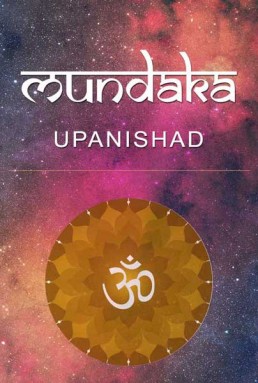देवाश्च सर्वे प्रतिदेवतासु ।
कर्माणि विज्ञानमयश्च आत्मा
परेऽव्यये सर्वे एकीभवन्ति ॥ ७॥
devāśca sarve pratidevatāsu .
karmāṇi vijñānamayaśca ātmā
pare’vyaye sarve ekībhavanti .. 7..
गताः (gatāḥ) – gone away or enter into
कलाः (kalāḥ) – parts (phases)
पञ्चदश (pañcadaśa) – fifteen
प्रतिष्ठाः (pratiṣṭhāḥ) – stay
देवाश्च (devāśca) – and devatās (senses)
सर्वे (sarve) – all
प्रतिदेवतासु (pratidevatāsu) – in the corresponding devas (deities)
कर्माणि (karmāṇi) – deeds
विज्ञानमयः (vijñānamayaḥ) – full of knowledge
च (ca) – and
आत्मा (ātmā) – Ᾱtman
परे (pare) – highest
अव्यये (avyaye) – imperishable
सर्व (sarva) – all
एकीभवन्ति (ekībhavanti) – get united
Mundaka Upanishad Introduction
Mundaka Upanishad Invocation
Mundaka 1 – Chapter 1 – Verse 1
Mundaka 1 – Chapter 1 – Verse 2
Mundaka 1 – Chapter 1 – Verse 3
Mundaka 1 – Chapter 1 – Verse 4
Mundaka 1 – Chapter 1 – Verse 5
Mundaka 1 – Chapter 1 – Verse 6
Mundaka 1 – Chapter 1 – Verse 7
Mundaka 1 – Chapter 1 – Verse 8
Mundaka 1 – Chapter 1 – Verse 9
Mundaka 1 – Chapter 2 – Verse 1
Mundaka 1 – Chapter 2 – Verse 2
Mundaka 1 – Chapter 2 – Verse 3
Mundaka 1 – Chapter 2 – Verse 4
Mundaka 1 – Chapter 2 – Verse 5
Mundaka 1 – Chapter 2 – Verse 6
Mundaka 1 – Chapter 2 – Verse 7
Mundaka 1 – Chapter 2 – Verse 8
Mundaka 1 – Chapter 2 – Verse 9
Mundaka 1 – Chapter 2 – Verse 10
Mundaka 1 – Chapter 2 – Verse 11
Mundaka 1 – Chapter 2 – Verse 12
Mundaka 1 – Chapter 2 – Verse 13
Mundaka 2 – Chapter 1 – Verse 1
Mundaka 2 – Chapter 1 – Verse 2
Mundaka 2 – Chapter 1 – Verse 3
Mundaka 2 – Chapter 1 – Verse 4
Mundaka 2 – Chapter 1 – Verse 5
Mundaka 2 – Chapter 1 – Verse 6
Mundaka 2 – Chapter 1 – Verse 7
Mundaka 2 – Chapter 1 – Verse 8
Mundaka 2 – Chapter 1 – Verse 9
Mundaka 2 – Chapter 2 – Verse 10
Mundaka 2 – Chapter 2 – Verse 1
Mundaka 2 – Chapter 2 – Verse 2
Mundaka 2 – Chapter 2 – Verse 3
Mundaka 2 – Chapter 2 – Verse 4
Mundaka 2 – Chapter 2 – Verse 5
Mundaka 2 – Chapter 2 – Verse 6
Mundaka 2 – Chapter 2 – Verse 7
Mundaka 2 – Chapter 2 – Verse 8
Mundaka 2 – Chapter 2 – Verse 9
Mundaka 2 – Chapter 2 – Verse 10
Mundaka 2 – Chapter 2 – Verse 11
Mundaka 3 – Chapter 1 – Verse 1
Mundaka 3 – Chapter 1 – Verse 2
Mundaka 3 – Chapter 1 – Verse 3
Mundaka 3 – Chapter 1 – Verse 4
Mundaka 3 – Chapter 1 – Verse 5
Mundaka 3 – Chapter 1 – Verse 6
Mundaka 3 – Chapter 1 – Verse 7
Mundaka 3 – Chapter 1 – Verse 8
Mundaka 3 – Chapter 1 – Verse 9
Mundaka 3 – Chapter 1 – Verse 10
Mundaka 3 – Chapter 2 – Verse 1
Mundaka 3 – Chapter 2 – Verse 2
Mundaka 3 – Chapter 2 – Verse 3
Mundaka 3 – Chapter 2 – Verse 4
Mundaka 3 – Chapter 2 – Verse 5
Mundaka 3 – Chapter 2 – Verse 6
Mundaka 3 – Chapter 2 – Verse 7
Mundaka 3 – Chapter 2 – Verse 8
Mundaka 3 – Chapter 2 – Verse 9
Mundaka 3 – Chapter 2 – Verse 10
Mundaka 3 – Chapter 2 – Verse 11
Mundaka 3 – Chapter 2 – Verse 12

Mundaka Upanishad – Verse 7 – Mundaka-3-2-7-gatāḥ kalāḥ – In Sanskrit with English Transliteration, Meaning and Commentary by Adi Shankaracharya (Sankara Bhashya) – Mundaka-3-2-7

Sri Shankara’s Commentary (Bhashya) translated by S. Sitarama Sastri
Com.—Moreover, the knowers of Brahman regard emancipation as consisting only in the release from bondage, samsara, ignorance and the rest not as something produced. Besides at the time of emancipation the kalas which produce the body, pranas etc., go back to their own seat, i.e., cause. The word ‘Pratishtha’ is accusative plural. Fifteen: fifteen in number already enumerated in the last prasna and well known. Devas, the powers adhering to the body, and lodged in the senses such as the eye, etc.; all these go to the corresponding deities such as the sun, etc.; also those actions of the seeker after emancipation which have not begun to bear fruit (for those which have begun to bear fruit can be consumed only by enjoyment) and the Atman limited by the intellect, i.e., who, mistaking the condition of the intellect so caused by ignorance for the Atman, has here entered into various bodies like the image of the sun, etc., into water, etc. (Karma being intended for the benefit of the Atman). Therefore ‘Vijnanamaya’ means ‘chiefly possessed of intellect.’ These and the Vijnanamaya Atman, after removal of the conditions imposed, become mingled as one in the Brahman, the highest, the imperishable, endless, indestructible, all-pervading like the akas, unborn, undecaying, immortal, beneficent, fearless, having neither before nor after, nor in, nor out, without a second, unconditioned, lose their distinctive features, i.e., become one as the images of the sun, etc., become one with the sun when the surface, such as water (in which lie is reflected) is withdrawn and as the akas within the pot, etc., becomes one with the akas when the pot, etc., is withdrawn.